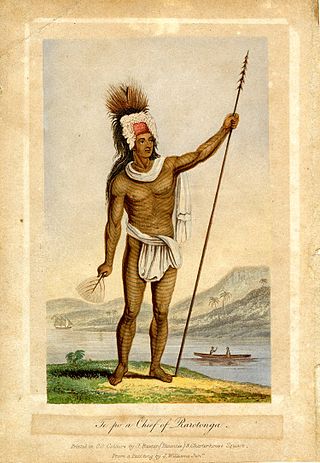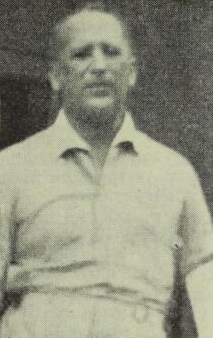
The Cook Islands is an island country in Polynesia, part of Oceania in the South Pacific Ocean. It consists of 15 islands whose total land area is approximately 236.7 square kilometres (91 sq mi). The Cook Islands' Exclusive Economic Zone (EEZ) covers 1,960,027 square kilometres (756,771 sq mi) of ocean. Avarua is its capital.

The Cook Islands are named after Captain James Cook, who visited the islands in 1773 and 1777, although Spanish navigator Alvaro de Mendaña was the first European to reach the islands in 1595. The Cook Islands became aligned to the United Kingdom in 1890, largely because of the fear of British residents that France might occupy the islands as it already had Tahiti.
The history of Niue is the history of the area and people of Niue, including its indigenous Polynesian societies. Niue was first settled by Polynesian sailors from Samoa in around 900 AD. Further settlers arrived from Tonga in the 16th century.
Resident commissioner was or is an official title of several different types of commissioners, who were or are representatives of any level of government. Historically, they were appointed by the British Crown in overseas protectorates, or colonies, and some still exist in this capacity. The United States of America once had a resident commissioner in the Philippines and the Puerto Rico resident commissioner resides in Washington DC. State governments of today's Republic of India have a resident commissioner to represent them in New Delhi.

Rakahanga is part of the Cook Islands, situated in the central-southern Pacific Ocean. The unspoilt atoll is 1,248 kilometres from the Cook Islands' capital, Rarotonga, and lies 1,111 kilometres south of the equator. Its nearest neighbour is Manihiki which is just 44 kilometres away. Rakahanga's area is 4 square kilometres (1.5 sq mi). Its highest point is approximately 5 metres above sea level. The population was 83 in the 2016 Census of Population & Dwellings, with a density ratio of 32 people per square kilometer. Since 2014 Rakahanga's electricity has been 100% solar generated. The Rakahanga-Manihiki language differs from Cook Islands Maori.

The Realm of New Zealand is the area over which the monarch of New Zealand is head of state. The realm is not a federation but is a collection of states and territories united under its monarch. New Zealand is an independent and sovereign state that has one territorial claim in Antarctica, one dependent territory (Tokelau), and two associated states. The Realm of New Zealand encompasses the three autonomous jurisdictions of New Zealand, the Cook Islands, and Niue.

The British Western Pacific Territories (BWPT) was a colonial entity created in 1877 for the administration of a series of Pacific islands in Oceania under a single representative of the British Crown, styled the High Commissioner for the Western Pacific. Except for Fiji and the Solomon Islands, most of these colonial possessions were relatively minor.

Albert Royle Henry was the first Premier of the Cook Islands and the founder and first leader of the Cook Islands Party (CIP). First elected Premier in August 1965, he was unseated in the aftermath of the 1978 election after an electoral petition found he had committed electoral fraud. He was later stripped of his knighthood. In 2023 he was posthumously pardoned.

The Parliament of the Cook Islands is the legislature of the Cook Islands. Originally established under New Zealand administration, it became the national legislature upon independence in 1965.

The Cook Islands are a constitutional monarchy within the Realm of New Zealand. Under the Cook Islands Constitution, the Sovereign in Right of New Zealand has been Head of State of the Cook Islands since 4 August 1965. The Sovereign is represented by the King's Representative; as such, the King is the de jure head of state, holding several powers that are his alone, while the King's Representative is sometimes referred to as the de facto head of state. The viceregal position is currently held by Tom Marsters.

The Kingdom of Rarotonga, named after the island of Rarotonga, was an independent kingdom established in the present-day Cook Islands in 1858. In 1888 it became a protectorate of the United Kingdom at its own request. In 1893 the name was changed to the Cook Islands Federation.

The Cook Islands Federation was created in 1891, after the Kingdom of Rarotonga was given the island of Aitutaki. It lasted until 1901, when it was given to New Zealand.

Edward Pohau Ellison, generally known as Ned Ellison and also as Pohau Erihana, was a New Zealand rugby player, doctor, and public health administrator.

Hugh Fraser Ayson was a New Zealand lawyer, judge, and public administrator. He was Resident Commissioner of the Cook Islands for two spells between 1923 and 1943.
The Department of Island Territories was a New Zealand government department that was tasked with administrating New Zealand's three Pacific Islands territories—the Cook Islands, Niue, and Tokelau—and the country's League of Nations mandate, Samoa. It was established on 3 October 1919 under the "External Affairs Bill" as the Department of External Affairs. In 1943, the Department was renamed the Department of Island Territories after a separate Department of External Affairs was created to conduct the country's external relations. In 1975, the Department was dissolved and its functions were absorbed back into the Ministry of Foreign Affairs, the successor to the External Affairs Department.

Stephen John Smith was a New Zealand public administrator. He served as Resident Commissioner of the Cook Islands from 1937 until 1938.
Geoffrey Nevill was a New Zealand public servant who served as Resident Commissioner of the Chatham Islands and Cook Islands between 1950 and 1961.
Capital punishment is not a legal penalty in Niue. While the death penalty was legal under New Zealand colonial rule, and death sentences were imposed by the courts, no executions were ever carried out. Capital punishment has been illegal in Niue since 1966, when the death penalty was effectively abolished by New Zealand colonial authorities.












